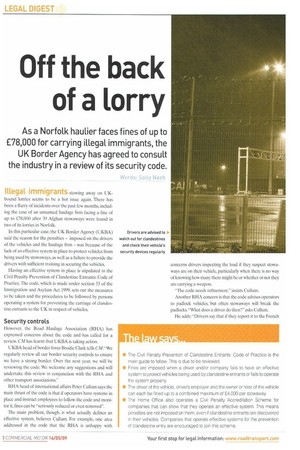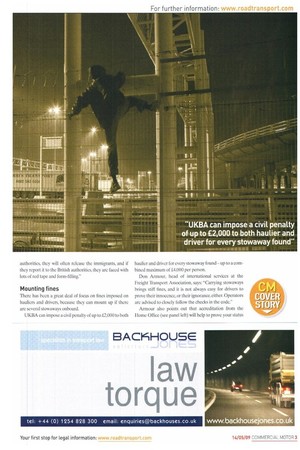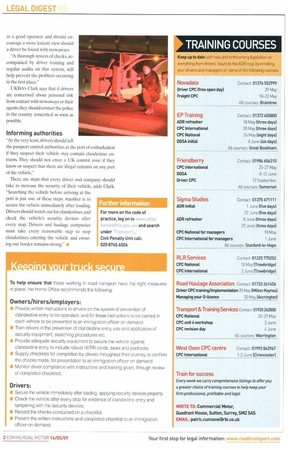Off the back of a lorry
Page 30

Page 31

Page 32

If you've noticed an error in this article please click here to report it so we can fix it.
As a Norfolk haulier faces fines of up to £78,000 for carrying illegal immigrants, the UK Border Agency has agreed to consult the industry in a review of its security code.
Words: Salty Nash megat immigrants stowing away on UKbound lorries seems to he a hot issue again. There has been a flurry of incidents over the past few months, including the case of an unnamed haulage firm facing a fine of up to £78,000 after 39 Afghan stowaways were found in two of its lorries in Norfolk.
In this particular case, the UK Border Agency (UKBA) said the reason for the penalties imposed on the drivers of the vehicles and the haulage firm was because of the lack of an effective system in place to protect vehicles from being used by stowaways, as well as a failure to provide the drivers with sufficient training in securing the vehicles.
Having an effective system in place is stipulated in the Civil Penalty Prevention of Clandestine Entrants: Code of Practice. The code, which is made under section 33 of the Immigration and Asylum Act 1999, sets out the measures to be taken and the procedures to be followed by persons operating a system for preventing the carriage of clandestine entrants to the UK in respect of vehicles.
Security controls
However. the Road Haulage Association (RHA) has expressed concerns about the code and has called for a review. CM has learnt that UKBA is taking action.
UKBA head of border force Brodie Clark tells CM: "We regularly review all our border security controls to ensure we have a strong border. Over the next year, we will be reviewing the code. We welcome any suggestions and will undertake this review in conjunction with the RHA and other transport associations."
RHA head of international affairs Peter Cullum says the main thrust of the code is that if operators have systems in place and instruct employees to follow the code and monitor it, fines can be "seriously reduced or even removed".
The main problem, though, is what actually defines an effective system, believes Cullum. For example, one area addressed in the code that the RHA is unhappy with concerns drivers inspecting the load if they suspect stowaways are on their vehicle, particularly when there is no way of knowing how many there might be or whether or not they are carrying a weapon.
"The code needs refinement." insists Cullum.
Another RHA concern is that the code advises operators to padlock vehicles, but often stowaways will break the padlocks -What does a driver do then?" asks Cullum.
He adds: "Drivers say that if they report it to the French authorities, they will often release the immigrants, and if they report it to the British authorities, they are faced with lots of red tape and form-filling."
Mounting fines
There has been a great deal of focus on fines imposed on hauliers and drivers, because they can mount up if there are several stowaways onboard.
UKBA can impose a civil penalty of up to £2,000 to both haulier and driver for every stowaway found — up to a combined maximum of £4,000 per person.
Don Armour, head of international services at the Freight Transport Association, says: "Carrying stowaways brings stiff fines, and it is not always easy for drivers to prove their innocence, or their ignorance, either. Operators are advised to closely follow the checks in the code."
Armour also points out that accreditation from the Home Office (see panel left) will help to prove your status
as a good operator and should encourage a more lenient view should a driver be found with stowaways.
"A thorough system of checks, accompanied by driver training and regular audits on that system, will help prevent the problem occurring in the first place."
UKBA's Clark says that if drivers are concerned about personal risk from contact with stowaways or their agents, they should contact the police in the country concerned as soon as possible.
Informing authorities
At the very least, drivers should tell the passport control authorities at the port of embarkation if they suspect their vehicle may contain clandestine entrants. They should not enter a UK control zone if they know or suspect that there are illegal entrants on any part of the vehicle."
There are steps that every driver and company should take to increase the security of their vehicle, adds Clark. "Searching the vehicle before arriving at the port is just one of these steps. Another is to secure the vehicle immediately after loading. Drivers should watch out tor clandestines and check the vehicle's security devices after every stop. Drivers and haulage companies must take every reasonable step to stop clandestines entering the vehicle and ensuring our border remains strong." •












































































































































